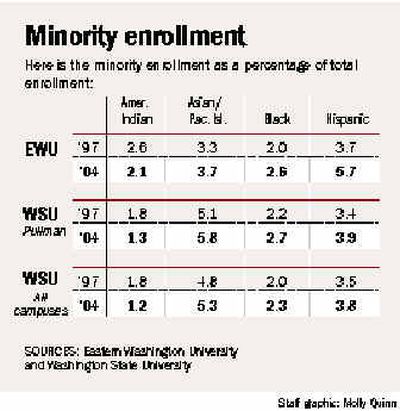Colleges seek to loosen I-200

OLYMPIA – Eight years ago, Washingtonians overwhelmingly passed Initiative 200, which banned racial preferences in public education or hiring.
But race is not irrelevant, many of the state’s public colleges say, and they’re now asking lawmakers to change the law so that college admissions offices can consider a student’s race.
“I-200 has had an unfortunate chilling effect on the attitude and beliefs of many of our students of color. … They do not feel welcome and wanted,” said Sally Savage, Washington State University’s vice president for university relations.
One after another Thursday, college officials, professors and minority group leaders stepped up to urge lawmakers to pass House Bill 1586. Nearly all of them echoed the same refrain: that race is a critical factor for campus diversity, and in an increasingly global economy, it serves all students well to learn alongside a diverse community of people not necessarily like themselves.
“No education is complete if it does not introduce them to people they do not know, people they may not like, people who do not look like them,” James Williams, a Federal Way attorney, told lawmakers.
Proponents of the status quo, however, say that the state’s colleges are generally increasing in diversity anyway. Considering a person’s race, they say, opens the door to discrimination against whites.
“We slammed the door on this issue. The door should stay closed,” said Roy, Wash., resident Daryl Treadway, looking out of place among the hearing’s gray suits and faculty-mixer atmosphere. Treadway showed up wearing a blaze orange jumpsuit and ball cap.
“Racial discrimination is wrong when it’s done by people,” Mukilteo, Wash., anti-tax activist Tim Eyman said. “It’s indefensible when it’s done by the government.”
The sponsor of the House bill, Rep. Phyllis Gutierrez Kenney, D-Seattle, says the bill doesn’t revoke I-200. The bill language says colleges can’t set aside a certain number of college slots. Nor can they award points or other values to applicants based on race.
“Not points. Not quotas,” she said.
The bill would allow race, color, ethnicity or national origin to be considered, although all student applicants would still have to meet minimum academic qualifications. Many states have similar laws, according to David Thorud, acting provost of the University of Washington.
“I-200, as it presently stands, inhibits our best and brightest minority students from matriculating here in their home state,” said Oscar Eason, president of the regional NAACP. Big-name colleges in other states, he said “are quick to accept them and offer them race-based assistance.”
Continuing with a color-blind policy, he said, “is likely to preserve the racial status quo.” Racism, he said, remains a problem.
Seattle conservative talk-radio host John Carlson – former chairman of the I-200 effort – said that enrollment numbers suggest that an increasing number of people of color are getting into the state’s colleges. Eight years after critics said that UW would come to stand for “University of Whites,” he said, the current freshman class at the University of Washington is more diverse than it’s ever been.
“We are a multi-racial, multi-ethnic society,” he told lawmakers. “The days of dividing people by race and treating them differently are over.”
Statistics from the state Higher Education Coordinating Board tend to support Carlson’s argument. From 1998 to 2003, minority enrollment at the state’s four-year colleges has tended to rise. The number of Asian-Americans and Pacific Islanders rose nearly 37 percent. The number of African-Americans rose 4 percent. Hispanic enrollment was up 30 percent. White enrollment rose 13 percent.
The major exception was American Indians, whose numbers at state four-year colleges dropped 12 percent. (American Indian enrollment rose 130 percent at the state’s private four-year schools.)
The gains have generally been more dramatic at the state’s two-year schools, where African-American enrollment increased 44 percent from 1998 to 2003. The number of Hispanic students rose 40 percent. White enrollment rose 14 percent.
It’s unclear how the bill will fare. Similar bills were introduced last year, but both died in committee. The Senate version died in the Judiciary Committee, chaired by Sen. Bob McCaslin, R-Spokane Valley. This year, however, Republicans no longer have enough votes to control the Senate, which may improve the proposal’s odds. It’s also quietly backed by several influential entities in Olympia, including Boeing, the Washington State Labor Council, the National Organization for Women and Gov. Christine Gregoire.
A hearing on the Senate version of the bill is slated for this morning.